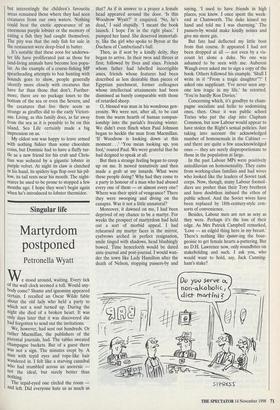Singular life
Martyrdom postponed
Petronella Wyatt
e stood around, waiting. Every tick of the wall clock seemed a toll. Would any- body come? Shame and ignominy appeared certain. I recalled an Oscar Wilde fable about the old lady who held a party to which not a soul turned up. During the night she died of a broken heart. It was only days later that it was discovered she had forgotten to send out the invitations.
We, however, had sent out hundreds. Or rather Macmillan, the publishers of the Parental journals, had. The tables sweated champagne buckets. But of a guest there was not a sign. The minutes crept by. A Man with tepid eyes and rope-like hair wandered in. I felt like a starving cannibal who had stumbled across an anorexic not the ideal, but surely better than nothing. The tepid-eyed one circled the room and left. Did everyone hate us as much as that? As if in answer to a prayer a female head appeared around the door. 'Is this Woodrow Wyatt?' it enquired. 'No, he's dead,' I said stupidly. 'I meant the book launch. I hope I'm in the right place.' I pumped her hand. She deserved immortali- ty, like the girl who spoke to Byron at the Duchess of Cumberland's ball.
Then, as if sent by a kindly deity, they began to arrive. In their twos and threes at first; followed by fives and sixes. Friends whom father had labelled incorrigible asses, friends whose features had been described as less desirable than pieces of Egyptian parchment, former colleagues whose intellectual attainments had been dismissed as barely comparable with those of retarded sheep.
0, blessed was man in his wondrous gen- erosity. We were not, after all, to be cast from the warm hearth of human compan- ionship into the pariah's freezing winter. We didn't even flinch when Paul Johnson began to heckle the man from Macmillan. `If Woodrow is looking down at this moment .. ."You mean looking up, you fool,' roared Paul. We were grateful that he had deigned to speak at all.
But then a strange feeling began to creep up on me. It moved tentatively and then made a grab at my innards. What were these people doing? Why had they come to a party in honour of a man who had abused every one of them — or almost every one? Where was their spirit of vengeance? There they were swooping and diving on the canapes. Was it not a little unnatural?
Moreover, it dawned on me, I had been deprived of my chance to be a martyr. For weeks the prospect of martyrdom had held out a sort of morbid appeal. I had rehearsed my martyr faces in the mirror, eyebrows arched in perfect resignation, smile tinged with shadows, head blushingly bowed. Time henceforth would be dated ante-journal and post-journal. I would wan- der the town like Lady Hamilton after the death of Nelson, stopping passers-by and saying, 'I used to have friends in high places, you know. I once spent the week- end at Chatsworth. The duke kissed my hand and told me I was charming.' The passers-by would make kindly noises and give me more gin.
But fate had deflected my little boat from that course. It appeared I had not been dropped at all — not even by a vis- count let alone a duke. No one was ashamed to be seen with me. Auberon Waugh even asked me to sign a copy of the book. Others followed his example. 'Shall I write in it "From a tragic daughter"?' I asked one supplicant. 'I've never seen any- one less tragic in my life,' he retorted. `You're hardly Ron Davies.'
Concerning which, it's goodbye to cham- pagne socialists and hello to sodomising ones, then. Once it was public school Tories who put the clap into Clapham Common, but now Labour would appear to have stolen the Right's sexual policies. Just taking into account the acknowledged number of homosexuals in the Cabinet and there are quite a few unacknowledged ones — they are surely disproportionate to those in the population at large.
In the past Labour MPs were positively antediluvian on homosexuality. They came from working-class families and had wives who looked like the leaders of Soviet tank corps. Now, though, many Labour footsol- diers are posher than their Tory brethren and have doubtless imbued the ethos of public school. And the Soviet wives have been replaced by 18th-century-style con- sorts of convenience.
Besides, Labour men are not as sexy as they were. Perhaps it's the loss of their edge. As Mrs Patrick Campbell remarked, `Love — an edged thing here in my breast.' There's nothing like epater-ing the bour- geoisie to get female hearts a-pattering. But no D.H. Lawrence now, only soundbites on stakeholding and such. I ask you, who would want to hold, say, Jack Cunning- ham's stake?


















































































 Previous page
Previous page